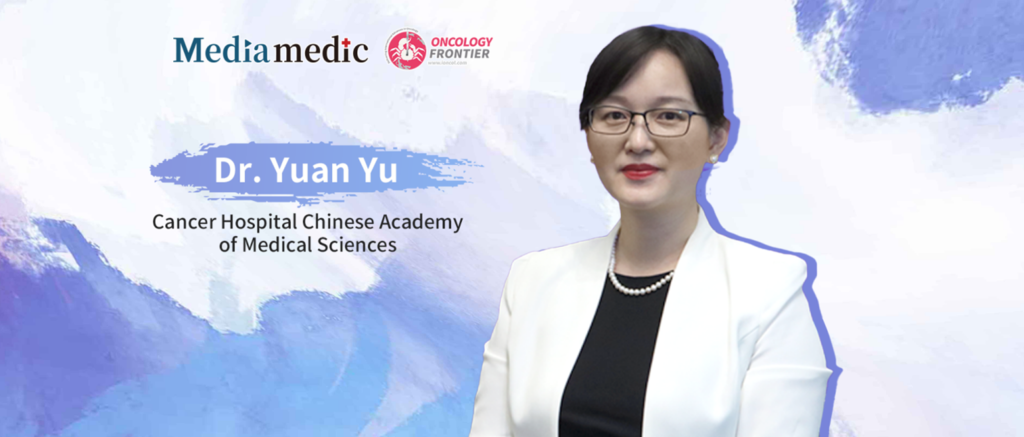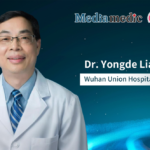
Editor's Note: At the 2024 CACA Integrated Esophageal Cancer Academic Conference, Dr. Yuan Yu, the inaugural chairman of the CACA Committee on Integrated Nursing for Esophageal Cancer and a leading expert at the Cancer Hospital Chinese Academy of Medical Sciences, delivered an engaging presentation on the latest research in the field of esophageal cancer nursing. During the conference, Oncology Frontier had the opportunity to interview Professor Yu to discuss her insights in detail. Below is a summary of the interview.Oncology Frontier: During the conference’s esophageal cancer integrated nursing session, you gave a talk on recent research advancements in the field of esophageal cancer nursing. Could you share some of the key highlights from your presentation?
Dr. Yuan Yu: Our team systematically reviewed the latest research in esophageal cancer nursing over the past five years, focusing on four core directions: description, explanation, prediction, and intervention. During this process, we employed bibliometric analysis and visual displays of literature, which revealed that symptom management is a critical area in nursing, directly impacting patients’ quality of life.
When optimizing nursing processes, we not only emphasized quantitative research in the natural sciences but also qualitative exploration within the humanities and social sciences to better understand individual patient needs. Additionally, we considered the interaction between patients and their natural environment, which allowed us to broaden our perspective and reflect on comprehensive patient care. This approach underscores the deep humanistic care embedded in our nursing practices.
Oncology Frontier: In this nursing session, what key concepts and advances in integrated esophageal cancer nursing were shared, and how might they guide clinical nursing practices?
Dr. Yuan Yu: This session featured a series of carefully curated presentations aimed at bringing the latest concepts and advances to the esophageal cancer nursing field. We were honored to have Director Yang Funuo from Henan Cancer Hospital, a leader in a National Natural Science Foundation project on esophageal cancer nursing. She shared valuable insights on applying for national-level projects, offering crucial guidance for future project submissions.
We also selected six outstanding studies from the 115 submissions received by the CACA Committee on Integrated Nursing for Esophageal Cancer, covering key areas such as symptom management and functional recovery. Moreover, the committee’s vice chairperson, Professor Wang Linghui from the First Medical Center of the PLA General Hospital, led the drafting of the first Chinese Expert Consensus on Nursing for Immune Checkpoint Inhibitor-Related Adverse Events in Esophageal Cancer Patients, which she presented in detail.
A notable feature of the session was the CACA Esophageal 1+1 Integrated Nursing Forum. Since its inception in March 2023, our committee has held these monthly forums at the end of each month, with each session featuring a case study and an expert-guided review of relevant guidelines. In the first session, I focused on managing esophageal cancer patients with diabetes and provided an expert review of diabetes management guidelines for these patients. Following evidence-based principles, we strive to close the loop between clinical practice and scientific evidence. This forum marked our first offline event, with September 28 being our 16th session. We recognized outstanding cases from the past 15 sessions to honor those who have made significant contributions in clinical nursing.
Oncology Frontier: As the inaugural chairperson of the CACA Committee on Integrated Nursing for Esophageal Cancer, could you share your committee’s future plans?
Dr. Yuan Yu: Since its establishment in March 2023, our committee has achieved several key milestones over the past year and a half. One of our major accomplishments is the successful introduction and translation of Oncology Nursing, a landmark publication by Springer, which has now been officially released.
Additionally, we have completed another significant project—writing Integrated Nursing for Esophageal Cancer: From Theory to Practice. Academician Fan Daiming, president of the Chinese Anti-Cancer Association, named the book and served as its honorary editor-in-chief, personally penning the preface. This 140,000-character volume has been finalized and is expected to be published in February 2025.
Furthermore, we released the first Chinese Expert Consensus on Nursing for Immune Checkpoint Inhibitor-Related Adverse Events in Esophageal Cancer Patients, and the second expert consensus on enhanced recovery in esophageal cancer treatment is forthcoming. In the future, we plan to develop more consensus guidelines to further advance the field of esophageal cancer nursing.
Oncology Frontier: China has a high incidence of esophageal cancer, and the treatment and recovery process for patients can be long and challenging. What are the key aspects of enhanced recovery in esophageal cancer surgery?
Dr. Yuan Yu: Enhanced recovery is an ongoing effort in the field of oncology surgery. Both surgeons and nursing staff aim to maximize the benefits of minimally invasive treatments and accelerate the recovery process. In recent years, the average postoperative hospital stay for esophageal cancer patients in China has been reduced to 7–10 days, a significant improvement achieved through the relentless efforts of healthcare professionals.
Optimizing care processes is crucial. Streamlining and seamlessly connecting each step of the treatment process greatly improves efficiency. Nurses play a central role, not only understanding and executing the doctors’ treatment plans but also monitoring treatment efficacy, managing side effects, and promptly identifying and addressing complications.
Esophageal cancer surgical nurses face immense challenges, as their work is rigorous and complex. Shorter hospital stays are closely tied to their efforts. Their responsibilities are expanding beyond the hospital to include pre-hospital prevention and post-discharge care. During the preventive phase, patients receive extensive education, while post-discharge, continuous interventions are provided to ensure a smooth recovery.
Home-based care is particularly crucial for esophageal cancer patients in extended care, including nutrition monitoring, symptom management, and emotional support to help patients reintegrate into society. Enhanced recovery is not just a goal; it requires careful planning of pre-hospital and post-hospital care to free up medical resources efficiently.
Oncology Frontier: Esophageal cancer patients have a high demand for post-discharge medical care. Could you discuss the future of post-discharge care for esophageal cancer patients and how to better establish a medical consortium between top-tier hospitals and community hospitals to meet this demand?
Dr. Yuan Yu: This is a critical issue that we are actively exploring. Esophageal cancer patients face numerous challenges after discharge. Compared to lung cancer patients, whose treatment process is relatively straightforward and recovery is faster after surgery, esophageal cancer patients undergo more invasive procedures such as digestive tract reconstruction and organ replacement, making post-discharge nutritional management a significant challenge. Managing enteral nutrition, ensuring safe oral feeding, and supplementing oral nutrition all present major difficulties.
We are continuously exploring best practices in care while considering who should assume these responsibilities. Since the 1980s, the concept of extended care, or supportive care, has gradually emerged, with telephone follow-ups becoming a popular method of communication. Through one-on-one communication, nurses or case managers can promptly understand patients’ recovery and provide targeted guidance. While this method is beneficial, we are constantly seeking more effective ways to meet the needs of esophageal cancer patients.
Expert Profile
Dr. Yuan Yu Deputy Chief Nurse, Master’s Degree Head Nurse, Department of Thoracic Surgery, Cancer Hospital, Chinese Academy of Medical Sciences Chairperson, CACA Committee on Integrated Nursing for Esophageal Cancer Group Leader, Oncology Professional Committee, Chinese Nursing Association Member, Integrated Nursing Working Committee, Chinese Anti-Cancer Association Standing Committee Member, CACA Committee on Integrated Rehabilitation for Esophageal Cancer Council Member, 9th Board of Directors, Chinese Anti-Cancer Association Council Member, China Smoking Control Association Committee Member, Tobacco Control and Lung Cancer Prevention Committee, China Smoking Control Association Member, Oncology Science Group, Beijing Thoracic Surgery Society Council Member, Beijing Nursing Association Member, Beijing Medical Innovation and Transformation Society Member, Infection Control Committee, Beijing Preventive Medicine Association Editorial Board Member, Chinese Journal of Clinical Oncology and Rehabilitation Reviewer, Journal of Modern Nursing in China, Esophageal Diseases, Chinese Clinical Case Database, Cancer Control, Heliyon, The Open Nursing Journal, Current Cancer Therapy Reviews, European Journal of Oncology Nursing, Scientific Reports


